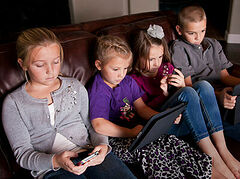The topic of bringing up children is relatively new because in antiquity, in ancient and Medieval times, little was written and said about this, probably because every child was born in a certain tradition and brought up in it. Today child raising traditions have collapsed, and many parents are at a loss as to how they should raise their children. As part of the “Let’s Talk” project of the Sretensky Monastery’s Spiritual and Educational Center, Archpriest Fyodor Borodin, the author of many books on child psychology and the upbringing of children, father of eight, rector of the Church of Sts. Cosmas and Damian in Maroseyka, Moscow, discussed this question.
People brought up in the fifties and sixties are very different from those growing up today. Firstly, because the environment in which they grew up is different, and, secondly, today parents are different—that is, we in Russia are the generation of parents of the post-Soviet period. I am fifty-three, and the next generation of parents are those living under the conditions of, as one very wise person called it, an “anthropological-gender explosion”, when everything is broken; and we are trying to build a Christian family on these fragments flying in all directions. It has gotten much harder. Much has changed. Grandparents are no longer directly involved in bringing up their grandchildren. Society is not involved either, and when it is, its influence is destructive. Most parents are now brought up in single-parent families, never knowing a happy and joyful relationship between parents. And, of course, this complicates the process of upbringing.
We have few well-tested educational instruments passed on to us by previous generations. Before, when someone behaved improperly, society would quickly make him reform. This is no longer the case. Before, a woman who left her husband would become so vulnerable and defenseless that she would think twice before doing it. In the Old Testament, one of the most frequently mentioned sins was offending a widow. A woman was absolutely defenseless without a man. She could be deprived of all her property, and no one would help her. That is no longer the case. How can we build a family if society does not support women? How can a woman listen to her husband if he does not know how to make responsible decisions?
There are many new challenges, including educational. How can you raise your child to know how to solve the many new challenges that face him, and protect him from destructive falls? How can you gradually give your child the right degree of freedom? And how can you do this in a large family where all the children are different? How can you protect your child from someone else’s influence in his teenage years? During this period, you shouldn’t scold a child, or the close bond with him might break. There are plenty of new questions, and I don’t have answers to many of them. We live in such a perplexing and challenging time.
Gadgets are the biggest problem
When asked about our children’s biggest problem, I answer: gadgets. There are things that my wife and I have come to understand and put into practice. First, parental control must be installed on any computer at home, because such a mess can come out that it will destroy the child’s soul. Secondly, we do not have the Wi-Fi working all the time, and children do not have access to gadgets whenever they want.
If some succeed in this, I bow down before them; but I personally believe that it is impossible to forbid a child to play computer games altogether. When you can no longer control the situation your child has a tantrum, and this breakdown is monstrous. We chose for our children an hour and a half of games a week—for example, on Sunday evenings. We also allow one or two movies—not on TV, but downloaded movies or those we watch online, which we all understand. We watch some movies (in which there is nothing harmful to the soul) together, and the children watch some on their own, but not many. And we definitely don’t allow a situation when a child always has a cellphone in his hands, the Wi-Fi is turned on permanently and he can do whatever he wants.
“I won’t set foot in church ever again”
Many parents turn to me with a different distress. A child grows up in a religious family and goes to church, but suddenly he becomes a different person: He doesn’t want to go to church anymore and no longer believes in God. I answer: The child must find his freedom—this is how God created man. He perceives this freedom as freedom from his parents. He wins it painfully, but his task is to learn how to use it. There is no mechanism in the Church to ensure that a child grows up and remains a believer. We know that the children of the Prophet Samuel, who spoke with God from childhood, grew up to be good-for-nothing. The Venerable Elder Alonius said, “Unless a person says in his heart, ‘There is only God and me,’ he cannot be saved.” A person should say: “Lord, here Thou art, and here am I. This is my personal meeting and relationship with Thee.” But he also can say: “I don’t want this.” And there’s nothing we can do here. As parents we can only testify, or rather, give our children a “taste” of grace—show them what real Christian life is so they can themselves encounter Christ’s presence in life.
This is hindered first of all by the parents’ sins, pride and forced religiosity. I will explain what this means. I knew a family with many children, a religious family, in which the father would hit his child during evening prayers if he turned his face away from the icons. Almost everyone who grows up under such conditions leaves the Church (not necessarily forever). For these children, prayer and experience of life in the Church were not associated with love but with force.
We are hypocritical when we say one thing but do another. When parents use their parental authority to promote their pride while appealing to the Gospel authority, the child feels this mendacity. Christ’s authority is undermined when the father is always right, when he refuses to ask forgiveness, even if he obviously sinned against his child. If I can come to my child to ask his forgiveness, I confirm that there is a law above me and him and I obey this law. It is a delusion to think that if parents ask their child’s forgiveness, this undermines their authority.
True, parents must not let themselves be manipulated. But there is the Law of God—if I have shouted at my child, I must come and say: “Forgive me, my little one!”, hug him and kiss him. This will heal the situation, and he will more readily believe my words that Christ expects this or that from him. Otherwise I manipulate him and use the Gospel to make him obey me. He understands this. True, he can’t object to this—but when his teenage years roll round, all his tears will come home to roost.
And yet we should give our children a taste of what a home church is. This is extremely important. First, it is vital for children to pray together with their father and mother. This is the most powerful means of integrating a child into church life and creating family unity. There is a sacrament in the family—the parents’ wedding. It is not just some seal in Heaven making them now husband and wife. The priest prays for the gift of perfect love, help for this, and grace in childrearing. And it’s all given to them. It is confirmed every time we stand together to pray.
A home church should be organized with a balance of hierarchy and conciliarity. One doesn’t work without the other. There can be no conciliarity in democracy. There is the one who bears the charisma and obedience for an ultimate decision, but if he does not listen to the voice of the Holy Spirit, Who acts through a conciliar discussion, then he too, can make wrong decisions. Therefore, a child, a wife, a mother-in-law should know that the final decision is up to the father; but he does the right thing, and not his own thing. For example, the child tells his father that he can’t go to church on Sunday because he is tired from schoolwork and needs to have a good sleep. Instead of forcing him, his father should answer that they will all stay at home, read a special Sunday prayer, read the Gospel about the Resurrection of Christ, sing the hymn “Having beheld the Resurrection of Christ…”, and discuss some parable read on this day in the churches. If the wife knows that her husband respects the principle of conciliarity, it is much easier for her to obey. These things should be shown to the child. Then Christ Himself gets in contact with him, and there is more hope that the child will not leave the Church.
Further, the way parish life is organized is very important. It should include things that are interesting to children and teenagers of both sexes. In addition to services, there should be something else for them. It can vary, but it should be a place where they are together. And Sunday school should be understood not only as a platform for the transfer of knowledge, but also as a platform to make new acquaintances and friends with other believers for the rest of their lives. A child goes to a school or college, or works in a team, but there are no Christians there. Who can he rely on? This is where the breakdown point often is. For example, we have camps, role-playing games, kayaking trips, grilling hot dogs with ketchup in the Sunday school yard, or celebrating birthdays in Sunday school. All the friends of my oldest sons are parish children with whom they went hiking fifteen to twenty years ago and spent their entire youth together. Two of my sons found their future wives on walking trips.
There should be a place where they are not disturbed and given the opportunity to spend time together. We call it the “Sunday School Veterans’ Club”, where they can come, chat, watch a movie, sing songs, and drink tea. They come from different parts of the city. The point is that it should be interesting to the child.
This applies to the family too, not just to the parish. There should be communication in spheres that interests the child. Then he will feel that he is sincerely needed. I am often asked: “My child stopped obeying me and got into a muddle. What should I do?” If the child has distanced himself from his parents, it’s too late. Such a situation has developed in the family as if the steering wheel in a car is not connected to the front wheels. You turn it, but there is no effect. This is an absolutely wrong situation. Who will advise a child better than his father and mother, who love him so much? This is a key mistake parents make today.
The relationship between children and parents in teenage years is strained to the limit. This bond must be built before the “awkward” stage. It is necessary to spend time with your children in the sphere that interests them. The parents should do homework with their child, and the child should understand that his father and mother are sincerely interested in him. You can read a book with him, tell him fairy tales, build a garden house together, walk with him in the woods, play football together. In order to hear the child you should be silent. Parents should not have expectations of what their child should be. The child may be completely different from you. And his path to God and relationship with Him may be different from yours. In one family there are completely different children, who all have their own unique relationships with the Lord. To hear it you need to listen to the child attentively. True, he is still small and less intellectually developed than you are, but if you want to be friends with him, be silent. Then his beauty will be revealed to you and you will be able to say and do something together with him that will help him. I have my own know-how. I tell my children stories, serial adventure sagas, for half a year. I take a well-known historical plot, some interesting era—for example, conquistadors or pirates. And there must be children of their age there, or just young guys and girls.
It’s only at twenty that you feel as if you’ve become an adult. In order for this communication to continue, it is very important when both the priest and the parish, just like parents in the family, respect the child. He cannot be forced and humiliated. His parents mustn’t punish him severely and deprive him of things. He cannot resist you now, but later he will simply turn around and leave you. Our child is given to us for a time. This is a gift and responsibility from the Lord. And most importantly—you must pass on to him the experience of living in love, warm him for the rest of his future life. The world around is evil, cold, calculating and selfish. And he will have to build his family on this experience of love. This is done only by example and the situation in his family. When a grown-up daughter tells her father and mother that she does not even want to get married because she feels so good with them, this is a sign that she was warmed by love at home.








